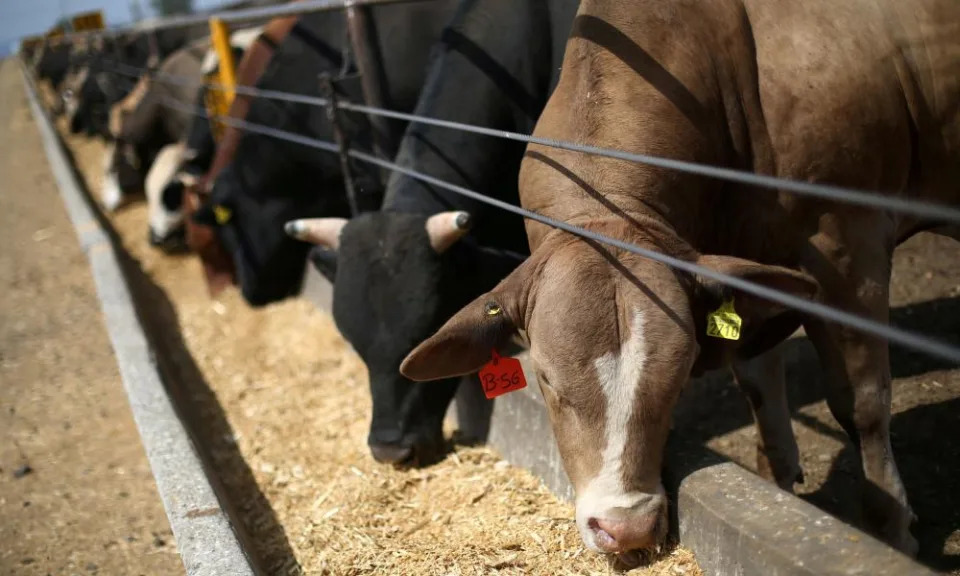Helena Horton Environment reporter
Thu, 9 March 2023

Photograph: Edgard Garrido/Reuters
Post-Brexit trade deals with Canada and Mexico will include imports of high-carbon beef and low-welfare pork, the Guardian can reveal.
There are fears there could be a Conservative party revolt, with the former environment secretary George Eustice raising concerns over low welfare standards for pigs in Canada, and an influential group of Tory MPs and peers gearing up to oppose the deals.
The deals also go against the advice of the Climate Change Committee, which wrote to the farming minister, Mark Spencer, after he refused to rule out Mexican beef imports. The committee said the UK’s carbon targets could be “compromised by a decision to allow the importation of meat with a higher carbon footprint than our own”.
In Canada there are more than 7,400 pig farms, and animal charities in the country say pigs there face castration, ear notching, tail docking and teeth trimming. Sows are kept for long periods in stalls that do not give them room to turn around, a practice banned in the UK. Pigs are also often left to live on cold, damp, slatted floors with no room for comfortable bedding or straw, the campaigners say.
Those involved in the deal have consulted Eustice, who previously criticised the Australia trade deal, in the hope he will not make similar remarks.
He said: “I am hearing that the volumes on beef are low, and that in return they have also got some dairy access which makes it a more reciprocal and balanced agreement. So looks like [the business and trade secretary] Kemi [Badenoch] has taken a tougher line than her predecessors. Pork could be more contentious, mainly because of lower welfare standards in Canada, but we will see.”
Tory MPs in the Conservative Animal Welfare Foundation (CAWF) are likely to raise concerns in parliament.
The group, which includes the former environment secretary Theresa Villiers and the MPs Dominic Raab, Henry Smith and the foreign minister and peer Zac Goldsmith, has opposed the trade deals.
Lorraine Platt, a campaigner who is co-founder of CAWF, said: “We are concerned by the prospect of a trade deal involving the importation of meat from Canada and Mexico. Many low-welfare practices such as the use of barren battery cages, sow stalls and hormone-fed beef are still used in Canada.
“Meanwhile Mexico’s animal welfare laws are considerably lower than our own – with little to no specific safeguards for the rearing of pigs, cattle or chickens. We urge the government to send a strong message abroad and stand firm in commitments not to compromise our animal welfare standards in future trade deals.”
Animal welfare charities have raised concerns, including over hormone-fed meat. James West, a senior policy manager at Compassion in World Farming, said: “The majority of Mexican pigs are raised in intensive conditions and the use of sow stalls, which have been illegal in the UK since 1999, are permitted.
“Furthermore, ractopamine, a growth promoter used in pigs that is banned in the UK, is also allowed in Mexico. Similarly, Canada, which permits the use of hormones in farming, has previously expressed its objection to the UK’s ban on hormone-fed beef.”
Minette Batters, the president of the National Farmers’ Union, warned it would not accept any further imports of beef after trade deals with Australia and New Zealand were accused of undercutting livestock farmers.
She said: “From Mexico our lines are pretty tough on this having given away so much on beef to Australia and New Zealand. We want the government to take a very, very firm line on further imports of beef.
“Environmental impacts are why beef was a sensitive sector, both in New Zealand and in Australia, and now in Mexico. And we want them now to really show that they are keeping their promises of not undermining farmers and trade deals. We don’t want to see further imports of beef.”
A government spokesperson said: “Negotiations on the UK’s accession to the Comprehensive and Progressive Agreement for Trans-Pacific Partnership are ongoing. The government has always been clear that we will not compromise the UK’s high food safety and animal welfare standards in trade negotiations. Our accession to CPTPP will be on terms that are right for UK companies, consumers and farmers.”
No comments:
Post a Comment